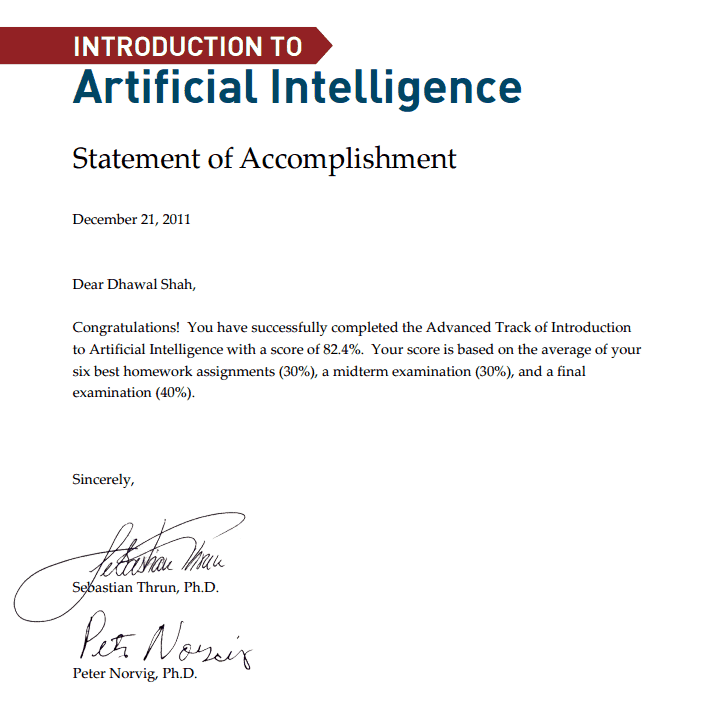Udacity’s Final Pivot? From Silicon Valley University to Corporate Training
Udacity raises $75M and pivots toward enterprise and government training.
Back in the Year of the MOOC, Udacity cofounder Sebastian Thrun famously proclaimed that in 50 years, there would only be 10 higher education institutions left in the world, and that Udacity would likely be one of them.
The lofty goal didn’t materialize, and over the years Udacity has gone through multiple pivots. But it might have found its ultimate business model: enterprise and government training.
Through Class Central, I’ve seen Udacity’s evolution firsthand, at least in terms of product and content. I was also part of the first cohort of Introduction to Artificial Intelligence, Sebastian Thrun and Peter Norvig’s online course that had 160,000 learners and was a Udacity precursor.

This course, along with a couple of other Stanford courses, kick-started the MOOC movement. I created Class Central as a way to keep track of these free courses!
I’ve probably written more about Udacity over the years than anyone else. The company’s current tone is quite different from what it used to be.
This is the company that helped Georgia Tech launch its $7k Online Master of Science in Computer Science (OMSCS), which has enrolled over 10k students and confers annually 7% of the US computer science master’s degrees. Udacity is not involved in the program anymore.
According to TechCrunch, Udacity recently raised $75 million in debt funding, and its “tech education” business is profitable. But what really caught my attention was this line:
“Currently, the company still provides direct-to-consumer (direct-to-learner?) courses, but it won’t be long, Dalporto (Udacity CEO) said, before enterprise and government customers account for about 80% of the company’s business.”
Basically, the real news here is Udacity’s marked pivot toward enterprises and governments. Though not surprising to Class Central, it raises questions about the future of Udacity’s consumer business. Earlier this year, Udacity China shut down, as exclusively reported by Class Central.
The last couple of years, Udacity has stayed out of the limelight. But we’ve been keeping tabs on them (some of our team members have completed multiple Nanodegrees) and noticed they were getting increasingly desperate trying to improve Nanodegrees’ monetization and profitability.
Udacity changes included:
- Hiking Nanodegree prices
- Sunsetting their mobile apps
- Reducing Nanodegrees creation costs
- Employing aggressive conversion tactics
This last example, in particular, seemed like it could damage the reputation Udacity built over the years. Class Central has noticed complaints on public forums like Reddit and Twitter.
@udacity when it comes to payment, you have option to Pay seamlessly, change payment method seamlessly, but to cancel an auto-renewal we gotta send a message to a bot and hope it gets picked up by a human eventually. Dark patterns at its best
— Kojo Eugene (@zMastaa) April 27, 2020
As Udacity’s consumer market becomes a smaller fraction of the company’s revenue, these complaints will matter less and less. Now, Udacity is focusing on selling existing Nanodegrees and creating tailored content for enterprises and governments around the world.
And their new model seems to be working. Udacity clients include “five of the world’s top seven aerospace companies, three of the Big Four professional services firms, the world’s leading pharmaceutical company, Egypt’s Information Technology Industry Development Agency, and three of the four branches of the United States Department of Defense.”
Notably, none of these organizations are what you’d consider “Silicon Valley.” Originally, Udacity’s pitch was aspirational: get the jobs of tomorrow, build the future. Now, it’s pragmatic.
It wouldn’t surprise me if in a couple of years, Udacity completely stopped its consumer business and focused solely on enterprises and governments.
TechCrunch’s entire article has more details and is worth reading.
If you want to learn more about Udacity’s evolution, check out Class Central’s annual analyses:
Tags







Anonymous
that totally makes sense, Udacity charges the highest prices on the MOOC market with 400$ per month while Coursera for example charges 50$ per month on average for their Professional Certificates, that is a very huge gap, if Udacity wants to attract individual customers they need to offer some reasonable affordable prices and watch out for what other MOOC offers and charges.
Alexandre
Thank you for the all these useful information! Class Central is very helpful and I hope it keeps unbiased, providing true and accurate for us, MOOC’s students.